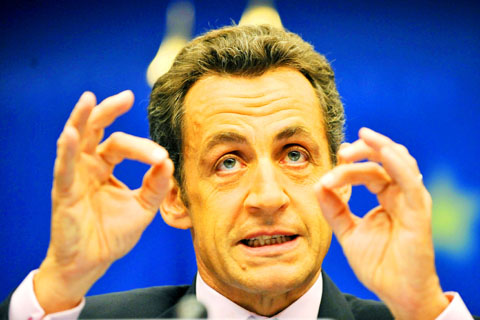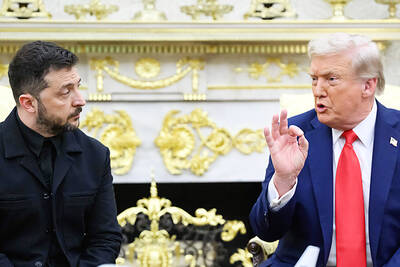EU leaders stuck to ambitious targets for tackling climate change on Wednesday, despite Italy and a group of eastern European nations calling for caution during the economic crisis.
French President Nicolas Sarkozy, who holds the bloc’s rotating presidency, voiced his determination to meet a December deadline for clinching agreement on a package of laws to combat global warming and promote renewable energy sources.
“I’m not giving up either on the objectives or the timetable,” Sarkozy told a news conference after chairing what he acknowledged was a tough discussion.

PHOTO: AFP
But Polish Prime Minister Donald Tusk threatened to use his veto unless more was done to shield Poland’s coal-based economy from the impact of the measures and Italian Prime Minister Silvio Berlusconi also wielded a veto threat to demand more time and less burden on industry.
Failing banks, plunging stock markets and warnings of recession pushed climate change down the agenda of the two-day summit, but no one challenged the key EU goal of cutting carbon dioxide emissions by 20 percent by 2020.
The other targets are to reduce energy consumption by 20 percent through efficiency measures by that date and to derive 20 percent of energy from renewable sources.
The 27-nation bloc aims to lead the world in battling global warming, mindful of UN predictions of more extreme weather and rising sea levels.
Eastern European countries and some of Europe’s traditional industries say the plan is too costly in light of the crisis, but several EU leaders said that rescuing the economy and the planet could go hand in hand.
“Let’s not hide behind the crisis,” Sarkozy said. “Global warming is there whether there’s a financial crisis or not. If Europe wants to carry weight in the world, then we have to do it.”
Poland, Hungary, Bulgaria, Estonia, Latvia, Lithuania, Romania and Slovakia called in a joint letter to the leaders for the rest of the EU to recognize their economic difficulties.
“If there is no other solution, we will use the possibility of a veto,” Tusk said. “The stakes are high. But the determination of Poland and eight other countries is starting to have its effects.”
Berlusconi called the whole idea of trading in the right to pollute “ridiculous” and told reporters: “I am ready to use our veto powers.”
European employment chief Vladimir Spidla said jobs lost in Europe’s older industries could be balanced by jobs created in new green industries — such as wind turbines or electric cars.
Some leaders linked the climate change battle to EU efforts to reduce the bloc’s dependence on oil and gas imports.
Energy security has soared to the top of the EU agenda since Russia’s invasion of Georgia highlighted the frailty of a key transit route for gas to enter Europe from the Caspian region — a route aimed at improving the EU’s range of energy choices.
British Prime Minister Gordon Brown said Europe’s move to a low-carbon economy would help reduce costly and volatile oil imports and protect it from sudden disruptions to supply.
“If the last year showed anything, it is that we must deal with the climate change problem, because oil is less affordable than it was, because energy security is more important than it was,” he said.
European Commission chief Jose Manuel Barroso, after talks with Brown, also urged the leaders to press ahead and not abandon Europe’s leadership role.
“If we now give any signal that we are not really committed to doing it, others will not have the incentive to do it,” he said.

Shamans in Peru on Monday gathered for an annual New Year’s ritual where they made predictions for the year to come, including illness for US President Donald Trump and the downfall of Venezuelan President Nicolas Maduro. “The United States should prepare itself because Donald Trump will fall seriously ill,” Juan de Dios Garcia proclaimed as he gathered with other shamans on a beach in southern Lima, dressed in traditional Andean ponchos and headdresses, and sprinkling flowers on the sand. The shamans carried large posters of world leaders, over which they crossed swords and burned incense, some of which they stomped on. In this

Near the entrance to the Panama Canal, a monument to China’s contributions to the interoceanic waterway was torn down on Saturday night by order of local authorities. The move comes as US President Donald Trump has made threats in the past few months to retake control of the canal, claiming Beijing has too much influence in its operations. In a surprising move that has been criticized by leaders in Panama and China, the mayor’s office of the locality of Arraijan ordered the demolition of the monument built in 2004 to symbolize friendship between the countries. The mayor’s office said in

‘TRUMP’S LONG GAME’: Minnesota Governor Tim Walz said that while fraud was a serious issue, the US president was politicizing it to defund programs for Minnesotans US President Donald Trump’s administration on Tuesday said it was auditing immigration cases involving US citizens of Somalian origin to detect fraud that could lead to denaturalization, or revocation of citizenship, while also announcing a freeze of childcare funds to Minnesota and demanding an audit of some daycare centers. “Under US law, if an individual procures citizenship on a fraudulent basis, that is grounds for denaturalization,” US Department of Homeland Security Assistant Secretary Tricia McLaughlin said in a statement. Denaturalization cases are rare and can take years. About 11 cases were pursued per year between 1990 and 2017, the Immigrant Legal Resource

‘RADICALLY DIFFERENT’: The Kremlin said no accord would be reached if the new deal with Kyiv’s input did not remain within the limits fixed by the US and Russia in August Ukrainian President Volodymyr Zelenskiy is to meet US President Donald Trump in Florida this weekend, but Russia on Friday accused him and his EU backers of seeking to “torpedo” a US-brokered plan to stop the fighting. Today’s meeting to discuss new peace proposals comes amidst Trump’s intensified efforts to broker an agreement on Europe’s worst conflict since World War II. The latest plan is a 20-point proposal that would freeze the war on its current front line, but open the door for Ukraine to pull back troops from the east, where demilitarized buffer zones could be created, according to details revealed by